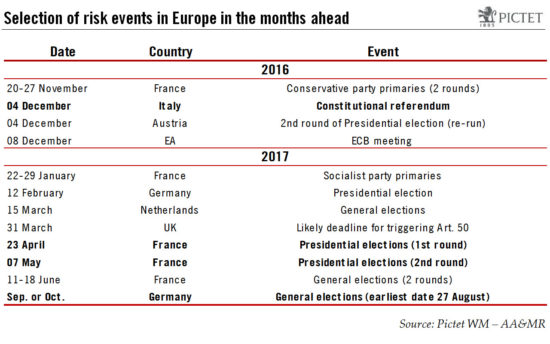Political risks never completely disappear from the European landscape, but we are not convinced that the US elections have materially increased the odds of another populist ‘accident’ in the euro area.While the Italian referendum is the most obvious near-term risk, we see extremely low chances of a nationalist, anti-European party winning a major election next year or holding a legally-binding referendum on EU/EMU membership. Apart from any other consideration, electoral processes are too different from the US to allow for lazy extrapolations.Taking a closer look at the political deadlines that are looming in Italy, France, Germany, the Netherlands and Austria, our view is as follows:The Italian referendum on 4 December is the big near-term risk but, regardless of the outcome, we rule out a Five Star Movement (5SM)-led government, let alone a referendum on EU membership. 5SM’s only chance of obtaining a clear majority in the next parliamentary election will depend on future legislative changes, which may not be enacted. In any case, Article 75 of the Italian constitution does not allow referendums on international treaties such as membership of the EU or the euro area.Should he win the Austrian presidential election on 4 December, Norbert Hofer would become the first far right-wing leader of a euro area member state.
Topics:
Frederik Ducrozet and Nadia Gharbi considers the following as important: European politics, European populism, French elections, Italian referendum, Macroview
This could be interesting, too:
Cesar Perez Ruiz writes Weekly View – Big Splits
Cesar Perez Ruiz writes Weekly View – Central Bank Halloween
Cesar Perez Ruiz writes Weekly View – Widening bottlenecks
Cesar Perez Ruiz writes Weekly View – Debt ceiling deadline postponed
Political risks never completely disappear from the European landscape, but we are not convinced that the US elections have materially increased the odds of another populist ‘accident’ in the euro area.

While the Italian referendum is the most obvious near-term risk, we see extremely low chances of a nationalist, anti-European party winning a major election next year or holding a legally-binding referendum on EU/EMU membership. Apart from any other consideration, electoral processes are too different from the US to allow for lazy extrapolations.
Taking a closer look at the political deadlines that are looming in Italy, France, Germany, the Netherlands and Austria, our view is as follows:
- The Italian referendum on 4 December is the big near-term risk but, regardless of the outcome, we rule out a Five Star Movement (5SM)-led government, let alone a referendum on EU membership. 5SM’s only chance of obtaining a clear majority in the next parliamentary election will depend on future legislative changes, which may not be enacted. In any case, Article 75 of the Italian constitution does not allow referendums on international treaties such as membership of the EU or the euro area.
- Should he win the Austrian presidential election on 4 December, Norbert Hofer would become the first far right-wing leader of a euro area member state. But the Austrian presidency is mainly ceremonial and Hofer has recently softened his tone regarding Austria’s membership of the EU and the euro area. The Austrian constitution does contain provisions that allow for the holding of a referendum on international treaties.
- Never say never, but we see the odds of Marine Le Pen winning the 2017 French presidential election as extremely low. A far-right win would require an unprecedented surge in votes for the FN and a collapse in voter participation.
- Notwithstanding the strength of far-right parties in Germany (AfD) and in the Netherlands (PVV), a continuity of pro-EU coalition governments looks very likely in both countries. In Germany, there seems to be no credible alternative to another grand coalition between the CDU/CSU and the SPD, led by Chancellor Merkel.
- Generally speaking, institutional set-ups make it difficult for nationalist, anti-establishment parties to form a government, or call a referendum on EU/EMU membership. Even among countries where a referendum can be called by popular initiative, there are few where the result could be made legally binding.
